Treasury, ark or safe box, piggy bank, are three instruments designed to save wealth. They are very old and still exist. This allows us some historical and linguistic comments.
The money box, (piggy bank) is a small box, usually of clay, to keep coins, that must be broken to recover them. Well, the old Romans give away their piggy banks to children or adults at a new year. Up to this point the culture and way of life of a few Romans ,who won all a huge empire, even in the smallest details permeated us. Because this custom of giving children piggy banks continues, although certainly in decline today. This intended to motivate into children the virtue of saving.
The Romans called the piggy bank loculus, locellus, loculamentum, ie little place, little box, bag, and aulula. These are generic terms which are applied accordingly to many small objects, sometimes divided into several compartments. Actually these words designate the compartments of a box or chest and by extension the box itself.
These objects are easily transportable, unlike the heavier "ark", also Latin word (arca) with which sometimes it seems to correspond, but a text of Juvenal in his Satires I, 81 ff. distinguishes perfectly the money box or bag (luculus) from a "safe" or chest or strongbox.
From the day when the rain-clouds lifted up the waters, and Deucalion climbed that mountain in his ship to seek an oracle—-that day when stones grew soft and warm with life, and Pyrrha showed maidens in nature's garb to men—-all the doings of mankind, their vows, their fears, their angers and their pleasures, their joys and goings to and fro, shall form the motley subject of my page. For when was Vice more rampant? When did the maw of Avarice gape wider? When was gambling so reckless? Men come not now with purses to the hazard of the gaming table, but with a treasure-chest beside them. What battles will you there see waged with a steward for armour-bearer! Is it a simple form of madness to lose a hundred thousand sesterces, and not have a shirt to give to a shivering slave? (Translated by G. G. Ramsay)
Ex quo Deucalion nimbis tollentibus aequor
navigio montem ascendit sortesque poposcit,
paulatimque anima caluerunt mollia saxa
et maribus nudas ostendit Pyrrha puellas,
85quidquid agunt homines, votum timor ira voluptas
gaudia discursus, nostri farrago libelli est.
et quando uberior vitiorum copia? quando
maior avaritiae patuit sinus? alea quando
hos animos? neque enim loculis comitantibus itur
90ad casum tabulae, posita sed luditur arca.
proelia quanta illic dispensatore videbis
armigero! simplexne furor sestertia centum
perdere et horrenti tunicam non reddere servo?
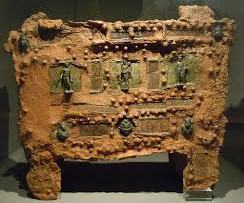
Chest of Turiaso (probably from the first century. Zaragoza Museum. (Spain).
These sympathetic boxes, piggy banks, have appeared with some frequency in the excavations, usually of clay, so it must be broken to remove the coins. They are in various kinds, the most common probably being a cylinder finish in a cone with a slot for coins, although there are also in other kinds, square, round, oval ..
Here is a copy of the II-III century AD purchased in Rome or Naples in 1906-9, currently at Johns Hopkins Archaeological Museum in Baltimore, Maryland.
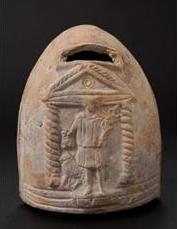
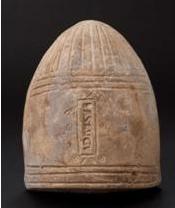
It is decorated with the figure of Mercury, holding caduceus or staff, with winged hat and a bag of money; there is also a lamb. At the back it is marked by Potter manufacturer BASAUGU, perhaps Bassienus Augurinus.
It is curious this figure reminiscent in form to those of primitive tholoi, although reduced to a thumbnail.
They have about twenty of this type appeared. They are usually decorated with figures of Mercury, Venus, Fortune and chariot.
Here is another of unknown origin, collected by Caylus in his Recueil d'antiquités Egyptiennes, Etruscan, Roman grecques et, Paris 1752-1757, T. IV, p. 270, tav. 82, 3.
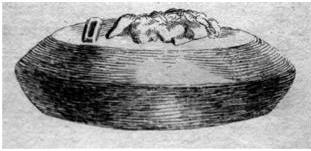
Or this one taken from Graeven, H. 1901. Die tönerne Sparbüchse im Altertum, fig. 5.
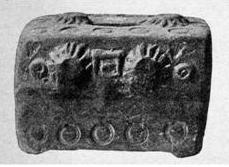
Or this one taken from W. HABEREY, Kornspeicher und M Jnzspartopf. Bonner Jb. 159
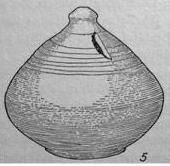
Or they found in Apulum (Romania), more similar to current.
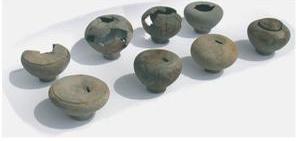
The prestigious Dictionnaire des Antiquités et Romaines Grecques of Daremberg et Saglio tells us in the the term "loculus" p. 1293:
"One of the most interesting discoveries of this kind is the one that was made in 1812 in the Baths of Titus: they found a round piggy bank, red clay, decorated with figures of three deities, yet full of coins that was introduced; it contained 251 denier in fact, the oldest being of the Republic, the most recent of the reign of Trajan. Fea, by whom we know this discovery, do not leave us the design of this small monument now lost "
“Une des découvertes les plus intéressantes en ce genre est cele qui fut faite en 1812 aux thermes de Titus: on y trouva une tirelire ronde, en terre cuite rouge, ornée des figures de trois divinités, pleine encoré des pièces qu’on y avait introduites; elle contenait en effet 251 deniers, les plus anciens étant de la République, les plus recents du commencement du règne de Trajan. Fea, qui nous fait connaitre cette découverte, ne nous a pas laissé le dessin de ce petit monument aujourd’hui perdu”
Anyway, these friendly tools can assist in developing the vice of greed, although they are rather well suited to develop the virtue of saving and the value of money that most mortals will find it extremely difficult to achieve.
Sometimes in them they are accumulated significant amounts, making true the words of Tertullian, in a passage in which he criticizes the pursuit of riches and exaggerated luxury in some women, in De Cultu Feminarum, 1,91,19:
From the smallest caskets is produced an ample patrimony
De brevissimis loculis patrimonium grande profertur
I reproduce the text to know the criticism that some stoic and Christians moralists do the immoderate luxury, so outrageous then as today:
On the Apparel of Women De cultu feminarum
Chapter IX. —-God's Distribution Must Regulate Our Desires, Otherwise We Become the Prey of Ambition and Its Attendant Evils.
For, as some particular things distributed by God over certain individual lands, and some one particular tract of sea, are mutually foreign one to the other, they are reciprocally either neglected or desired: (desired) among foreigners, as being rarities; neglected (rightly), if anywhere, among their own compatriots, because in them there is no such fervid longing for a glory which, among its own home-folk, is frigid. But, however, the rareness and outlandishness which arise out of that distribution of possessions which God has ordered as He willed, ever finding favour in the eyes of strangers, excites, from the simple fact of not having what God has made native to other places, the concupiscence of having it. Hence is educed another vice—-that of immoderate having; because although, perhaps, having may be permissible, still a limit is bound (to be observed). This (second vice) will be ambition; and hence, too, its name is to be interpreted, in that from concupiscence ambient in the mind it is born, with a view to the desire of glory,—-a grand desire, forsooth, which (as we have said) is recommended neither by nature nor by truth, but by a vicious passion of the mind,—-(namely, ) concupiscence. And there are other vices connected with ambition and glory. Thus they have withal enhanced the cost of things, in order that (thereby) they might add fuel to themselves also; for concupiscence becomes proportionably greater as it has set a higher value upon the thing which it has eagerly desired. From the smallest caskets is produced an ample patrimony. On a single thread is suspended a million of sesterces. One delicate neck carries about it forests and islands. The slender lobes of t. he ears exhaust a fortune; and the left hand, with its every finger, sports with a several money-bag. Such is the strength of ambition—-(equal) to bearing on one small body, and that a woman's, the product of so copious wealth. (Translated by the Rev. S. Thelwall. http://www.tertullian.org/)
Nam ut quaeque rerum per singulas quasque terras et unamquamque regionem maris a Deo distributa sunt, inuicem sibi peregrina, apud exteros mutuo rara, apud suos iure si utique uel negleguntur uel
There are also various other objects in the form of tree trunk or wood box intended for example to collect donations from the faithful in the temples, similar to the existing today in churches, the collection box. In this regard Josephus tells us this existence in the Jewish temple in Jerusalem for one made of a wooden trunk.
Josephus, Jewish Antiquities, IX, 8, 2.
Now Jehoash, king of Jerusalem, had an inclination to repair the temple of God; so he called Jehoiada, and bid him send the Levites and priests through all the country, to require half a shekel of silver for every head, towards the rebuilding and repairing of the temple, which was brought to decay by Jehoram, and Athaliah and her sons. But the high priest did not do this, as concluding that no one would willingly pay that money; but in the twenty-third year of Jehoash's reign, when the king sent for him and the Levites, and complained that they had not obeyed what he enjoined them, and still commanded them to take care of the rebuilding the temple, he used this stratagem for collecting the money, with which the multitude was pleased. He made a wooden chest, and closed it up fast on all sides, but opened one hole in it; he then set it in the temple beside the altar, and desired every one to cast into it, through the hole, what he pleased, for the repair of the temple. This contrivance was acceptable to the people, and they strove one with another, and brought in jointly large quantities of silver and gold; and when the scribe and the priest that were over the treasuries had emptied the chest, and counted the money in the king's presence, they then set it in its former place, and thus did they every day. But when the multitude appeared to have cast in as much as was wanted, the high priest Jehoiada, and king Joash, sent to hire masons and carpenters, and to buy large pieces of timber, and of the most curious sort; and when they had repaired the temple, they made use of the remaining gold and silver, which was not a little, for bowls, and basons, and cups, and other vessels, and they went on to make the altar every day fat with sacrifices of great value. And these things were taken suitable care of as long as Jehoiada lived.(Flavius Josephus. The Works of Flavius Josephus. Translated by. William Whiston, A.M. Auburn and Buffalo. John E. Beardsley. 1895.)
Martial references these boxes or piggy banks in his poems 12 and 13 of book Epigrams, XIV, 1 (entitled Apophoreta or Gifts):
12. Ivory Money-boxes
To fill these money-boxes with anything but yellow money is unfitting: let cheap wood carry silver. . (Translation by Walter C.A. Ker. The Loeb Classical Library)
Loculi eborei
Hos nisi de flava loculos implere moneta
Non decet: argentum vilia ligna ferant.
13. Wooden Money-boxes
If anything still remain at the bottom of me, a Little Money-box, it shall be a gift. Is there nothing? The little box itself shall be the gift. (Translation by Walter C.A. Ker. The Loeb Classical Library)
Loculi lignei
Si quid adhuc superest in nostri faece locelli,
Munus erit. Nihil est: ipse locellus erit.
Word "aulula" is obviously in relation to the word "Aulularia" which is the title of a comedy by Plautus in which the money is hidden in a small pot or ceramic case. An old miser, Euclión, finds a "small pot" full of money and he lives permanently scared thinking it's going to take.
Otherwise they called also loculus the boxes to store drugs, similar to our pillboxes today. They are often made of ivory, But there are similar things made of bronze.
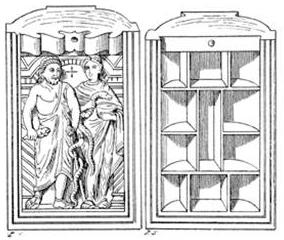
Drawing from Le Dictionnaire des Antiquités et Romaines Grecques of Daremberg et Saglio, p. 1294 in which Asclepius and Hygeia ( his daugther, the health) appear (name from which incidentally derives "hygiene"), with their attributes. First preserved as a relic in the church of Sainte Valerie, it is in the museum of Sion in Valais.
Ovid refers to these boxes: Fasti, VI, 749:
From ivory box, herbs he selected part,
The which the shade of Glaucus had yproved
The benefit:-for Aesculapius roved
Searching for simples once, and killed a snake,
And saw its fellowherbs remedial take
And him resuscitate. (Translation by John Benson Rose).
Gramina continuo loculis depromit eburnis:
Profuerant Glauci Manibus illa prius:
Tunc, quum observatas augur descendit in herbas,
Usus et auxilio est anguis ab angue dato.
They are also called so the boxes with surgical instruments
There are also numerous kinds of toilette boxes, which in Greek are called pyxis (πυξίς, plural pyxides) ceramic boxes with images of female life in the Gynoecium, spinning, wedding … As this pyxis of the called Painter of the Wedding (470 BC) from the Louvre Museum.
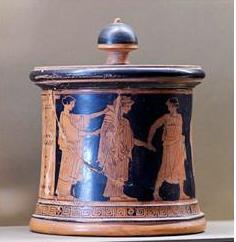
Some of really imaginative form, as these taken from the Daremberg-Saglio Dictionary as a dove or foot-shaped with compartments for blushes, eye drops or rouge. They are found in Praeneste.
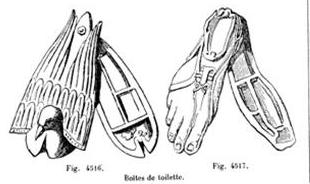
There are also loculi or boxes to store jewelry, keys, clothes, papers. Like this to rings to which Martial refers in the book XI, poem 59, and which he calls "dactiloteca" from Greek δάκτυλος, dactylos, finger.
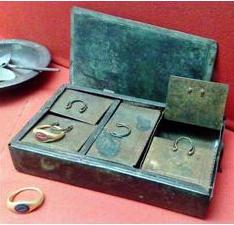
Martial, Epigrammata, book XI, 59
Six rings Charinus wears on each of his fingers, and he does not take off at night nor when he bathes. Do you ask the reason? He has not got a ring-case.
(Translation by Walter C.A. Ker, M.A.. The Loeb Classical Library)
Senos Charinus omnibus digitis gerit,
Nec nocte ponit anulos,
Nec cum lavatur. Causa quae sit, quaeritis?
Dactyliothecam non habet.
Or this of wood, bone and bronze from the first century of the Naples National Archaeological Museum.
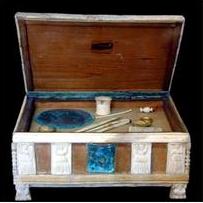
Or this one of Mers-les-Bains (80); Paris, Cabinet des Médailles de la BnF.; dim. 125 x 46mm
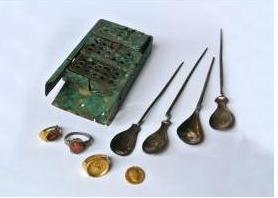
Loculus are also the Loculus Archimedius, the columbarium niches, the cells in a hive, the compartments of a burial, the coffin, the place of a warehouse or cell or cave to put the barrels, ballot box to vote, the library shelf , manger for horses, divided pools into compartments piscinae loculatae, small boxes for dried figs … Even it is called as well the bag or folder of school.
As I said, anyway "arcae loculatae" are the paint boxes with compartments to house the paintings without mixing with them Varro sets a curious comparison in De Re Rustica III, 17.4:
On Agriculture
For just as Pausias and the other painters of the same school have large boxes with compartments for keeping their pigments of different colours, so these people have ponds with compartments for keeping the varieties of fish separate, as if they were holy and more inviolate than those in Lydia about which, Varro, you used to say that while you were sacrificing, they would come up in schools, at the sound of a flute, to the edge of the shore and the altar, because no one dared catch them (the same time as that at which you saw the dancing islands of the Lydians); just so no cook dares 'haul these fish over the coals.'
Translation by W. D. Hooper and H. B. Ash, LOEB Classical Library)
Nam ut Pausias et ceteri pictores eiusdem generis loculatas magnas habent arculas, ubi discolores sint cerae, sic hi loculatas habent piscinas, ubi dispares disclusos habeant pisces, quos, proinde ut sacri sint ac sanctiores quam illi in Lydia, quos sacrificanti tibi, Varro, ad tibicinem gregatim venisse dicebas ad extremum litus atque aram, quod eos capere auderet nemo, cum eodem tempore insulas Lydorum ibi χορευούσας vidisses, sic hos piscis nemo cocus in ius vocare audet.

